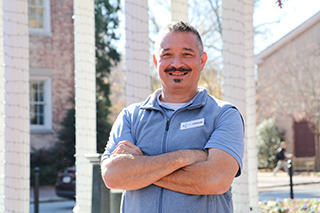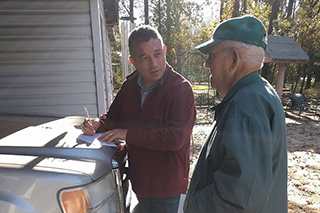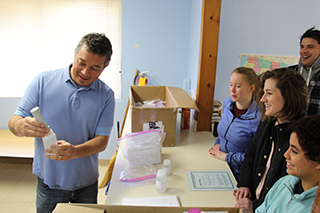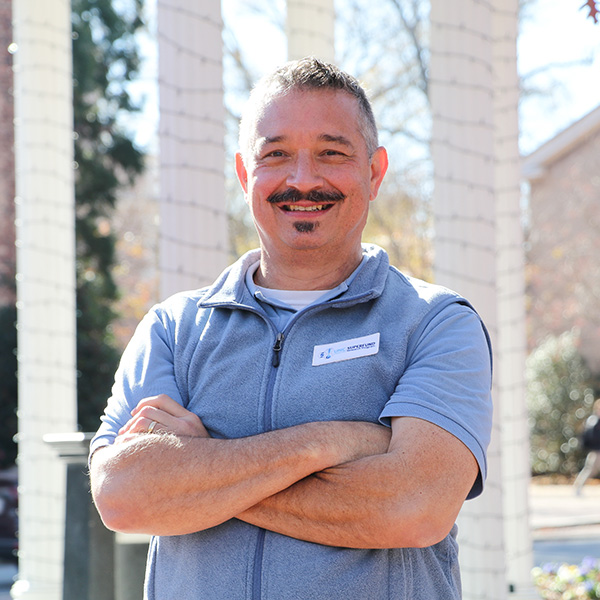
Andrew George, Ph.D., is the UNC SRP Center’s community engagement coordinator and spends his days working with community partners and UNC’s study participants. (Photo courtesy of Andrew George)
In North Carolina, 2.4 million people — nearly a quarter of the state’s population — rely on private wells. About 25% of those wells are contaminated with metals, such as arsenic, manganese, and lead, at levels above federal safety standards, according to NIEHS-funded research. For Andrew George, Ph.D., helping protect North Carolinians from those pollutants is a full-time job.
As community engagement coordinator at the University of North Carolina at Chapel Hill’s Center for Public Engagement with Science (CPES), which NIEHS supports, George connects communities with information about the health effects of metal exposures and resources for testing and treating their well water.
“We engage the community in participatory science — we don’t just parachute in and disappear with the research,” George said. “We communicate our research findings to the community. That’s part of our formula.”
Natural Connections
George traces his interest in environmental health and community outreach to growing up in Florida. The local swamp ecology and fauna fascinated him so much that, as a middle schooler, he volunteered at a local nature museum where he got his feet wet engaging with public audiences.
A couple years after graduating with a bachelor’s in political ecology from Appalachian State University in Boone, North Carolina, George became the executive director of the Southern Appalachian Biodiversity Project, a small nonprofit focused on forest habitat conservation. Success hinged on building strong partnerships with communities and local organizations, George explained. More than 30 years later, he still collaborates with some of the same environmental leaders from his nonprofit days, while also cultivating new partnerships.
“I think a lot of our success at CPES is because we value small nonprofit groups, small community-led groups, and neighborhood organizations,” George explained. “We look at them not just as members of ‘fence-line communities’ — places close to hazardous waste-producing facilities — who can tell us what’s going on, but as our active partners in trying to address some of the problems.”
Uncharted Waters
In the 2010s, the UNC Superfund Research Program (SRP) team, funded by NIEHS, discovered that North Carolina has a serious problem with naturally occurring arsenic. Arsenic can affect human health in numerous ways, depending on the length and extent of exposure, and is a metal of concern for SRP. The North Carolina Slate Belt, a geological feature underlying the Appalachian foothills, harbors natural arsenic that leaches into groundwater and can invade wells, explained George, who also supports UNC SRP efforts.
State law requires well testing at the time of construction but at no time thereafter, even upon sale of a property. When George joined UNC in 2015, he learned that North Carolinians in remote areas and people of color were under-represented in publicly available well water data. He suspected that these groups might be disproportionately exposed to metals.

George collects information from a North Carolina property owner about his well water. George and the UNC SRP team emphasize outreach to rural and under-resourced communities. (Photo courtesy of Andrew George)
With the guidance and facilitation of local partners across the state — such as a local environmental steward called the Lumber Riverkeeper, and the Union County environmental health department — George sought to continue and expand the UNC SRP team’s decades-long outreach to communities.
“We recruited deliberately, to make sure we had a good sample of well users in our study, representative of the people in our state,” George explained. “Our community partners were critical to our success.”
The UNC SRP team and their partners found creative ways to conduct testing, including sending well tests directly to homes, with explicit and easy-to-understand directions. Residents could collect a water sample from their tap and mail it to UNC free of charge.
If the researchers detected high levels of metals, they worked with residents to reduce exposures. For example, the UNC SRP team immediately provided affected residents with a filter pitcher certified to remove contaminants.
“We got these filters to people within 12 to 24 hours,” George shared. “It helps, when you call folks up and you have bad news, to at least give them peace of mind in the short term.”
“We have been able to provide filters to study participants free of charge, a near-term solution that has been especially important for low-income participants,” added CPES director and UNC SRP Community Engagement Core (CEC) leader Kathleen Gray, Ph.D.
Wellsprings of Local Potential
Building off earlier work, UNC SRP more recently investigated arsenic exposure in well water in Union County, within the North Carolina Slate Belt. Working with partners such as the Union County Health Department, the nonprofit Clean Water for North Carolina, the county’s NAACP chapter, and NC Cooperative Extension at North Carolina State University, the team has knocked on doors, handed out flyers, left information in restaurants, and posted information on local government television to recruit well users for their research.

George demonstrates well water collecting and testing techniques for UNC students. (Photo courtesy of Andrew George)
After analyzing their data, the team made a troubling finding. Nearly 20% of the wells were contaminated with arsenic, with some significantly above the federal limit. The CEC’s research translation team and SRP investigators immediately reported the results back to the study participants and sent pitcher filters to reduce exposures.
Then, the team held a community education meeting, where they shared their data, plus county resources for well rehabilitation and other solutions for addressing the contamination.
“We have a lot of expertise on research translation,” George stated. “Sarah Yelton, the UNC SRP research translation coordinator, helps us make sure our materials are tight, coherent, and easily accessible to lay audiences.” Yelton is the CPES environmental education and citizen science program manager, is a member of the CEC, and leads communications strategy and materials development.
What happened after the meeting still amazes George. Well users in one Union County town used the personalized report-back data to lobby the town government for water line extensions, which would connect their residences to municipal water lines. The town council voted to support the extensions, provided design funding, and is now working to secure construction funding, according to George.
“This is exactly what we’re hoping to have happen with our work,” he said. “We get people thinking about the issue. They directly apply our data to the problem. They work with their communities, partners, neighbors, and local health departments to think about creative solutions. Then, hopefully, in the end, they get a permanent, long-term solution that protects their health and their children’s health.”
Partnership Power
The dedication of community partners cannot be overstated, George noted. For example, UNC SRP has worked with Jefferson Currie II, the Lumber Riverkeeper, since 2018, when they conducted a study of Hurricane Florence’s impact on private well water quality in Robeson and surrounding counties.
Currie is a member of the Lumbee Tribe that comprises a significant portion of the county’s population, so he has a deep connection with the local community.
“He knew where to go, he knew how to seek out potential people for our study,” George said of Currie. “We went down some dirt roads and to some areas that, I think, previous studies have probably overlooked.”
AAs they collected data about water quality post-hurricane, the team also asked questions about residents’ testing habits. Of 476 private well users enrolled for testing, the team found over half had never checked their well water. Their findings also revealed clear disparities.
“We found that high-income, White populations had 10 times greater odds of testing their water,” George explained. “Also, they had over four times greater odds of treating their water than low-income, non-White populations.”
Lately, George and UNC SRP colleagues have again turned their attention to Robeson County. They will be gathering data to help answer community questions and concerns about how local contamination may be affecting a culturally important site for the Lumbee Tribe. Together with partners, the team will design and conduct community-engaged research into arsenic sources in drinking water. They will also try to address other water quality issues potentially affecting the community’s health.
“Part of why I like Andrew is we’re both here for the same reason, which is to do something meaningful,” Currie said. “We can’t change the world — no one person can do that — but you can help your little corner do a little better. Andrew is doing what he’s doing for the right reason, which is to help people.”
Andrew George


